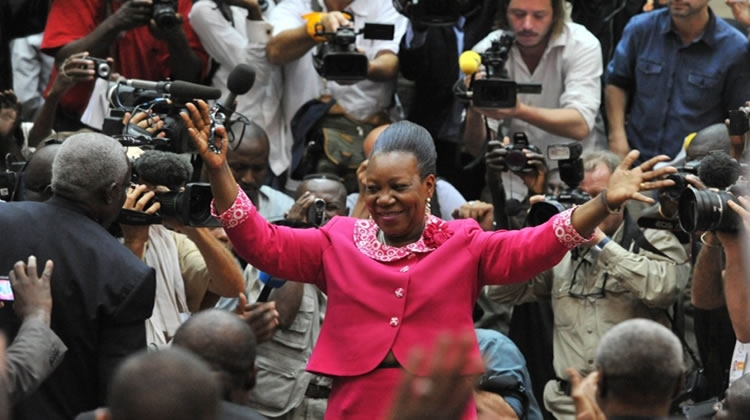
Since independence, men have always run the country and they have failed at the job. Now, we're going to try something else with a woman and see how that goes."
This innocuous comment from Christian Bernis Latakpi, 24, a Congolese university student, encapsulates what many feel in the DRC (and the world in general), that peace in Congo is needed and perhaps newly appointed interim president Catherine Samba-Panza would be just the change that the country needed after months of bloodshed.
So who is she?
Samba-Panza was born on 26 June 1954 in Chad to a Cameroonian father and a mother from the Central African Republic (CAR). Prior to politics she was a businesswoman and corporate lawyer. She moved to the CAR at the age of 18. She later trained as a lawyer at Panthéon-Assas University in Paris. She was appointed Mayor of Bangui, the capital of CAR, by the National Transitional Council (CNT) during the 2012-13 conflict. Her appointment was accepted by both sides in the conflict and also by French President Francois Hollande. At her recent appointment ceremony she left little doubt as to her self confidence.
"From today, I am the president of all Central Africans," declared Catherine Samba-Panza in a manner that left no doubt that she meant what she said. "I appeal to each and every one of you to help rebuild our fatherland," she said immediately after being elected interim president of the Central African Republic. To get here, Samba-Panza beat seven other candidates. Among them were two women and two sons of former presidents. They all had to meet the stringent requirements set by the National Transitional Council. All those who had held political office under previous interim president Michel Djotodia, as well as all party leaders and active members of the military were not allowed to run for the presidency. Also among those excluded from the top job were members of militia groups.
Djotodia took office in March 2013 after Islamist Seleka rebels staged a coup that ousted President Francois Bozize. Djotodia resigned in early January 2014, following pressure from the international community. Lawyer and mayor
Samba-Panza was appointed mayor of the Central African Republic's capital Bangui after Seleka rebels ousted president Bozize. She herself never belonged to the Seleka group. According to the French Catholic daily newspaper "La Croix," the news of her appointment as interim president was well received by most Bangui residents even though the people themselves did not take part in the election.
In the eyes of the business community Samba-Panza is the right person for the job. Development and human rights organizations have also welcomed the appointment of the first female to such a high profile job in CAR, wrote "La Croix." The 59 year-old was born in Chad and studied law in France where two of her three children still live. Before entering politics, she worked as a corporate lawyer. She was also active in a women's rights organization.
Hoping for unity
"She is a president who can unite both the country and the political elite," said Paul Simon Handy, deputy director at the Institute for Security Studies (ISS) in South Africa. Desire Nzanga Kolingba, who emerged as runner-up in the presidential elections, congratulated Samba-Panza on her victory. "I take this opportunity to urge all our fellow countrymen to join hands with Samba-Panza, to lead our country out of this chaos," said Kolingba in an interview with DW. Samba-Panza faces a huge task of bringing peace between Seleka rebels and anti-balaka militias Samba-Panza failed to win an absolute majority and had to compete in a runoff election against Kolingba, whose father was a former CAR president. In the runoff, 75 deputies voted for Samba-Panza, 53 for Kolingba.
Many tasks, little time
The new interim president now faces the huge task of bringing peace to the sectarian conflict between the Muslim Seleka fighters and the Christian anti-balaka militias, as well as facilitating the return of hundreds of thousands of refugees to their villages and restoring a functioning government. "I call on my children, the anti-balaka, to lay down their arms in response to my appointment. And to my children, the Seleka rebels, you too have to lay down your arms," she said during her first speech after being elected.
Paul Simon Handy, however, doubts whether the militias will take her words to heart. "She will need more than just her motherly style to convince the armed groups to cease their hostilities. She will need security personnel who will force the armed groups to lay down their arms if they do not do so voluntarily." Nevertheless, Handy believes Samba-Panza has a good chance of bringing about reconciliation in the country. "But I am afraid that this process will take longer than her period in office as interim president," he added.
The Central African Republic has to hold a fresh election by February 2015 at the latest. France, however, wants the election to be held this year. Current law excludes the interim president from running.
Back









 Share Your Story
Share Your Story